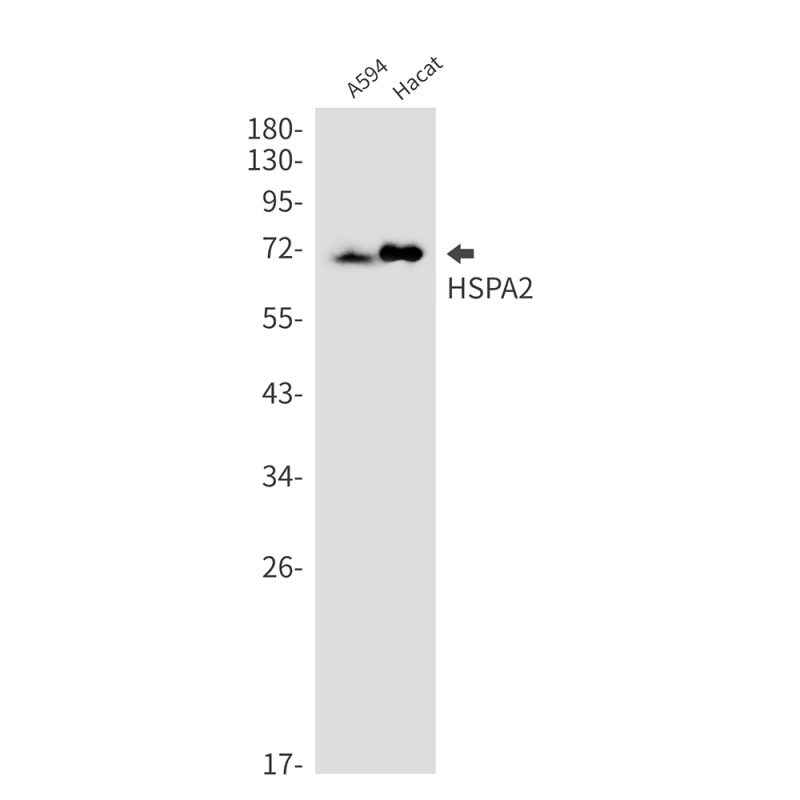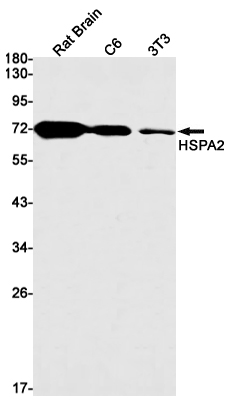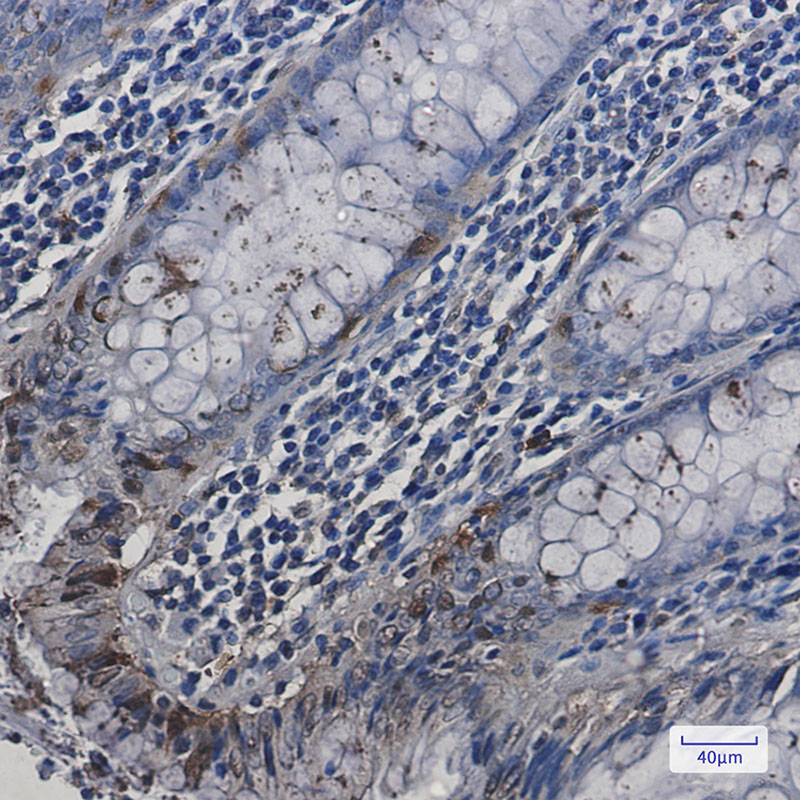


| WB | 1/500-1/1000 | Human,Mouse,Rat |
| IF | 咨询技术 | Human,Mouse,Rat |
| IHC | 1/50-1/100 | Human,Mouse,Rat |
| ICC | 技术咨询 | Human,Mouse,Rat |
| FCM | 咨询技术 | Human,Mouse,Rat |
| Elisa | 咨询技术 | Human,Mouse,Rat |
| Aliases | HSPA2; Heat shock 70kD protein 2; HSP70-2; HSP70-3; Heat shock 70 kDa protein 2; Heat shock 70kDa protein 2 |
| Entrez GeneID | 3306 |
| WB Predicted band size | Calculated MW: 70 kDa; Observed MW: 70 kDa |
| Host/Isotype | Rabbit IgG |
| Antibody Type | Primary antibody |
| Storage | Store at 4°C short term. Aliquot and store at -20°C long term. Avoid freeze/thaw cycles. |
| Species Reactivity | Human,Mouse,Rat |
| Immunogen | Recombinant protein of human HSPA2 |
| Formulation | Purified antibody in TBS with 0.05% sodium azide,0.05%BSA and 50% glycerol. |
+ +
以下是关于HspA2抗体的3篇代表性文献,按研究领域分类简要概括:
---
1. **文献名称**:*HSPA2 deficiency manifests in spermatozoa as azoospermia in humans and male infertility in mice*
**作者**:Kyrgiafini MA, et al.
**摘要**:本研究利用HspA2特异性抗体检测人类和小鼠精子中的HspA2表达,发现HspA2缺失会导致精子发生异常,与男性不育密切相关。抗体在定位HspA2于精子头部和尾部中起关键作用。
2. **文献名称**:*Heat shock protein A2 (HSPA2) as a prognostic biomarker in colorectal cancer*
**作者**:Wang Y, et al.
**摘要**:通过免疫组化(使用HspA2抗体)分析结直肠癌组织,发现HspA2高表达与患者生存率降低相关,提示其可作为癌症预后标志物,并可能参与肿瘤侵袭通路。
3. **文献名称**:*Development of a monoclonal antibody specific to HSPA2 for detecting stress-induced cellular responses*
**作者**:Lee S, et al.
**摘要**:报道了一种新型HspA2单克隆抗体的开发,验证其在Western blot和免疫荧光中的特异性,证明其在热休克条件下追踪细胞应激反应的实用性。
---
**注**:若需获取具体文献,建议通过PubMed/Google Scholar搜索标题或作者名,结合关键词"HspA2 antibody"+"cancer"/"infertility"进一步筛选。部分研究可能涉及抗体在诊断工具开发或机制研究中的双重应用。
HspA2. also known as heat shock protein A2. is a member of the HSP70 family of molecular chaperones. It plays a critical role in cellular stress responses, facilitating protein folding, preventing aggregation, and assisting in the repair or degradation of damaged proteins. Initially identified for its involvement in spermatogenesis, HspA2 is highly expressed in germ cells, particularly during meiosis, where it contributes to chromosomal synapsis and genomic stability. Its function extends beyond reproduction, with roles in cellular stress adaptation, apoptosis regulation, and cancer biology.
HspA2 antibodies are essential tools for studying its expression, localization, and interactions in biological systems. Commercially available antibodies (polyclonal or monoclonal) are designed to target specific epitopes of HspA2. enabling applications such as Western blotting, immunohistochemistry, and immunofluorescence. Research using these antibodies has revealed elevated HspA2 levels in various cancers, including lung, breast, and hepatocellular carcinomas, suggesting its potential as a diagnostic or prognostic biomarker. Conversely, reduced HspA2 expression in spermatozoa correlates with male infertility, highlighting its clinical relevance.
Recent studies also explore HspA2's involvement in neurodegenerative diseases and aging, emphasizing its dual role in cytoprotection and disease pathogenesis. Validating antibody specificity remains critical due to high sequence homology among HSP70 family members. Overall, HspA2 antibodies are pivotal in unraveling its multifaceted roles in health and disease.
×